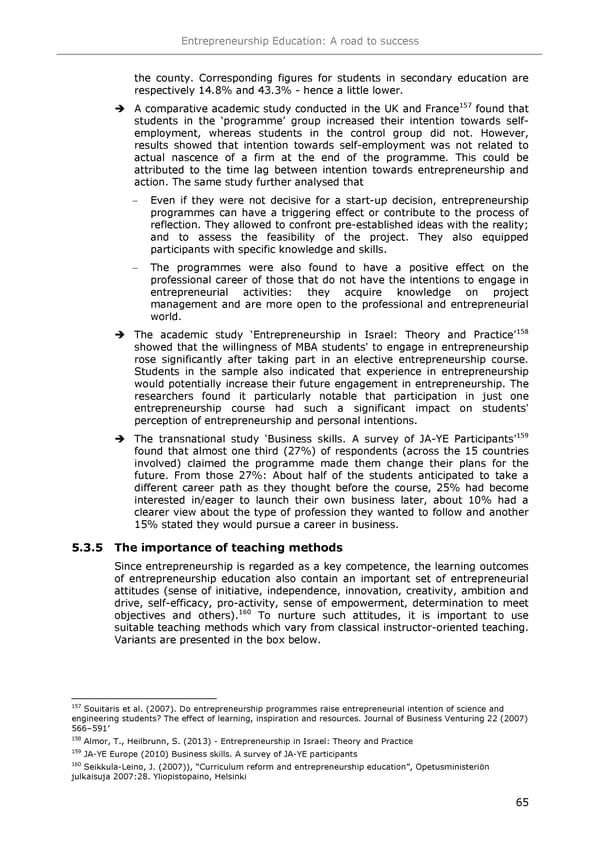Entrepreneurship Education: A road to success the county. Corresponding figures for students in secondary education are respectively 14.8% and 43.3% - hence a little lower. A comparative academic study conducted in the UK and France157 found that students in the 8programme9 group increased their intention towards self- employment, whereas students in the control group did not. However, results showed that intention towards self-employment was not related to actual nascence of a firm at the end of the programme. This could be attributed to the time lag between intention towards entrepreneurship and action. The same study further analysed that Even if they were not decisive for a start-up decision, entrepreneurship programmes can have a triggering effect or contribute to the process of reflection. They allowed to confront pre-established ideas with the reality; and to assess the feasibility of the project. They also equipped participants with specific knowledge and skills. The programmes were also found to have a positive effect on the professional career of those that do not have the intentions to engage in entrepreneurial activities: they acquire knowledge on project management and are more open to the professional and entrepreneurial world. The academic study 8Entrepreneurship in Israel: Theory and Practice9158 showed that the willingness of MBA students' to engage in entrepreneurship rose significantly after taking part in an elective entrepreneurship course. Students in the sample also indicated that experience in entrepreneurship would potentially increase their future engagement in entrepreneurship. The researchers found it particularly notable that participation in just one entrepreneurship course had such a significant impact on students' perception of entrepreneurship and personal intentions. 159 The transnational study 8Business skills. A survey of JA-YE Participants9 found that almost one third (27%) of respondents (across the 15 countries involved) claimed the programme made them change their plans for the future. From those 27%: About half of the students anticipated to take a different career path as they thought before the course, 25% had become interested in/eager to launch their own business later, about 10% had a clearer view about the type of profession they wanted to follow and another 15% stated they would pursue a career in business. 5.3.5 The importance of teaching methods Since entrepreneurship is regarded as a key competence, the learning outcomes of entrepreneurship education also contain an important set of entrepreneurial attitudes (sense of initiative, independence, innovation, creativity, ambition and drive, self-efficacy, pro-activity, sense of empowerment, determination to meet 160 objectives and others). To nurture such attitudes, it is important to use suitable teaching methods which vary from classical instructor-oriented teaching. Variants are presented in the box below. 157 Souitaris et al. (2007). Do entrepreneurship programmes raise entrepreneurial intention of science and engineering students? The effect of learning, inspiration and resources. Journal of Business Venturing 22 (2007) 56635919 158 Almor, T., Heilbrunn, S. (2013) - Entrepreneurship in Israel: Theory and Practice 159 JA-YE Europe (2010) Business skills. A survey of JA-YE participants 160 Seikkula-Leino, J. (2007)),
 Entrepreneurship Education Page 68 Page 70
Entrepreneurship Education Page 68 Page 70